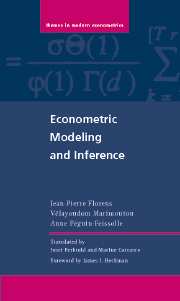Book contents
- Frontmatter
- Contents
- Foreword
- Preface
- I Statistical Methods
- II Regression Models
- 7 Conditional Expectation
- 8 Univariate Regression
- 9 Generalized Least Squares Method, Heteroskedasticity, and Multivariate Regression
- 10 Nonparametric Estimation of the Regression
- 11 Discrete Variables and Partially Observed Models
- III Dynamic Models
- IV Structural Modeling
- Bibliography
- Index
7 - Conditional Expectation
- Frontmatter
- Contents
- Foreword
- Preface
- I Statistical Methods
- II Regression Models
- 7 Conditional Expectation
- 8 Univariate Regression
- 9 Generalized Least Squares Method, Heteroskedasticity, and Multivariate Regression
- 10 Nonparametric Estimation of the Regression
- 11 Discrete Variables and Partially Observed Models
- III Dynamic Models
- IV Structural Modeling
- Bibliography
- Index
Summary
Introduction
The concept of conditional expectation is fundamental in econometrics because regression models are statistical models of conditional expectation. We consider here conditional expectation with respect to a random vector, but it would be possible to define it more generally with respect to a σ-algebra.
We place ourselves in the Hilbert space L2 of square integrable variables relative to a reference probability distribution: if z is a real random variable belonging to this space, then E(z2) < ∞. Recall that L2 is a normed vector space on ℝ with the norm defined by ∥z∥ = [E(z2)]1/2. If z1 and z2 are two elements of this space, then we can write their inner product as E(z1z2); these variables are said to be orthogonal in the sense of L2 if E(z1z2) = 0. Moreover, we say that a sequence zn in this space converges to a random variable z if ∥zn − z∥ → 0 when n → +∞. This notion of orthogonality and of mean square convergence (we also say “in the sense of L2” or “in quadratic norm”) will allow us in the following to use the notions of orthogonal projection and best approximations in terms of least squares.
The usual demand on rigorousness requires to distinguish carefully between equality of random variables and almost sure equality. Here, we will not make this distinction, the mathematical readers can naturally add the necessary Pθ – a.s.
Information
- Type
- Chapter
- Information
- Econometric Modeling and Inference , pp. 129 - 140Publisher: Cambridge University PressPrint publication year: 2007
